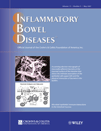MDR1 polymorphisms and response to azathioprine therapy in patients with Crohn's disease
Abstract
Background: To investigate the contribution of multidrug resistance 1 (MDR1) gene pharmacogenetics (G2677T/A and C3435T) to the efficacy of azathioprine in inducing remission in patients with Crohn's disease (CD).
Methods: A cohort of 327 unrelated Spanish patients with CD recruited from a single center was studied. All patients were rigorously followed up for at least 2 years (mean time, 11.5 years). A case-control analysis of MDR1 G2677T/A and C3435T SNPs and 2 loci haplotypes in 112 steroid-dependent CD patients treated with azathioprine was performed. Patients were classified on the basis of response to azathioprine.
Results: A total 76 patients treated with azathioprine for longer than 3 months were included. Remission was achieved in 42 CD patients (55.3%). A higher frequency of the 2677TT genotype was found in nonresponders than in responders (17.65% versus 7.14%; OR = 2.8; 95% CI; 0.6–12.1; P = 0.11). Nonresponders to azathioprine were found to have a higher frequency of the 3435TT genotype than did CD patients who had achieved clinical remission (17.64% versus 4.76%; OR = 4.3; 95% CI, 0.8–22.8; P = 0.06). The 2677T/3435T haplotype was also more abundant in nonresponders (29.4% versus 20.2%), whereas the 2677G/3435C haplotype was more frequent in responders (58.3% versus 47.1%). Lack of response to azathioprine therapy in CD patients was 1.8-fold greater in carriers of the 2677T/3435T haplotype than in carriers of the 2677G/3435C haplotype (OR = 1.8; 95% CI, 0.82–3.9; P = 0.14).
Conclusions: The results of our study indicate higher frequencies of the 2677TT and 3435TT genotypes and the 2677T/3435T haplotype in CD patients who did not respond to azathioprine. Additional replications in independent populations would confirm the real impact of these polymorphisms in response to azathioprine therapy.
(Inflamm Bowel Dis 2007)




